|
Despite end-of-week gains most equity indexes declined last week as continued worries about the European debt situation combined with slower economic growth in key countries made investors somewhat wary of risk. With two trading days left in May (except in the U.S.) most indexes followed here are down for the month. By week's end, buyers selectively returned to risk assets after the most recent selloff on euro debt fears. In addition, optimism is being held in check by disappointing U.S. data which has added to worries that the country is in a soft patch.
Group of Eight summit
The Group of Eight concluded their annual summit Friday, this year held in Deauville, France. In its official declaration, the G-8 directed multilateral development banks to take the lead in coordinating aid of over $20 billion for Egypt and Tunisia. The official declaration avoided giving any specific detail about the amount of new aid that individual countries were willing to commit to the region. The $20 billion number consisted of funds already pledged and in the process of being pledged by international institutions.
The G-8, which includes the three largest members of the eurozone (Germany, France and Italy), said Europe would continue to tackle its debt crisis "with determination" and pursue "rigorous consolidation" and structural reforms to bring its public finances under control. It also said that the U.S. "will put in place a clear and credible medium-term fiscal-consolidation framework, consistent with considerations of job creation and economic growth," while saying that Japan would address the sustainability of its public finances after tackling the more immediate need for reconstruction after the natural and nuclear disasters that it suffered in March.
OECD forecasts stronger growth
According to the Organization for Economic Cooperation and Development twice-a-year Economic Outlook, the global economic recovery is on track, helped by a stronger United States. However, threats ranging from high oil prices to European sovereign debt could yet combine to create a bout of stagflation. OECD said that the U.S. and eurozone economies were growing faster than expected in their November 2010 forecasts, although Japan's economy was set to contract after the March earthquake, tsunami and nuclear crisis. As a result, it said the Federal Reserve should look to raise interest rates this year, while the European Central Bank could afford to pause its tightening cycle for a while and Japan faced no pressure to act.
OECD forecast world growth would ease to 4.2 percent this year from 4.9 percent in 2010 before accelerating to 4.6 percent in 2012. The OECD said the U.S. would grow 2.6 percent this year instead of its earlier estimate of 2.2 percent in November. It also raised its growth outlook for the eurozone from 1.7 percent to 2.0 percent for 2011. Japan is estimated to contract 0.9 percent in 2011 rather than the earlier forecast of 1.7 percent growth. The OECD also cited a slow recovery in Japan as a possible threat to its economic partners, especially if global supply chains remain disrupted as a result.
|
|
2010 |
2011 |
% Change |
|
Index |
Dec. 31 |
May 20 |
May 27 |
Week |
Year |
| Asia/Pacific |
|
|
|
|
|
|
| Australia |
All Ordinaries |
4846.9 |
4807.7 |
4760.3 |
-1.0% |
-1.8% |
| Japan |
Nikkei 225 |
10228.9 |
9607.1 |
9521.9 |
-0.9% |
-6.9% |
|
Topix |
898.8 |
827.8 |
824.9 |
-0.3% |
-8.2% |
| Hong Kong |
Hang Seng |
23035.5 |
23199.4 |
23118.1 |
-0.4% |
0.4% |
| S. Korea |
Kospi |
2051.0 |
2111.5 |
2100.2 |
-0.5% |
2.4% |
| Singapore |
STI |
3190.0 |
3168.5 |
3135.5 |
-1.0% |
-1.7% |
| China |
Shanghai Composite |
2808.1 |
2858.5 |
2710.0 |
-5.2% |
-1.8% |
|
|
|
|
|
|
|
| India |
Sensex 30 |
20509.1 |
18326.1 |
18266.1 |
-0.3% |
-10.9% |
| Indonesia |
Jakarta Composite |
3703.5 |
3873.0 |
3832.4 |
-1.0% |
3.5% |
| Malaysia |
KLCI |
1518.9 |
1541.0 |
1548.7 |
0.5% |
2.0% |
| Philippines |
PSEi |
4201.1 |
4285.2 |
4274.5 |
-0.2% |
1.7% |
| Taiwan |
Taiex |
8972.5 |
8837.0 |
8810.0 |
-0.3% |
-1.8% |
| Thailand |
SET |
1032.8 |
1072.9 |
1067.0 |
-0.6% |
3.3% |
|
|
|
|
|
|
|
| Europe |
|
|
|
|
|
|
| UK |
FTSE 100 |
5899.9 |
5948.5 |
5938.9 |
-0.2% |
0.7% |
| France |
CAC |
3804.8 |
3990.9 |
3951.0 |
-1.0% |
3.8% |
| Germany |
XETRA DAX |
6914.2 |
7266.8 |
7163.5 |
-1.4% |
3.6% |
|
|
|
|
|
|
|
| North America |
|
|
|
|
|
|
| United States |
Dow |
11577.5 |
12512.0 |
12441.6 |
-0.6% |
7.5% |
|
NASDAQ |
2652.9 |
2803.3 |
2796.9 |
-0.2% |
5.4% |
|
S&P 500 |
1257.6 |
1333.3 |
1331.1 |
-0.2% |
5.8% |
| Canada |
S&P/TSX Comp. |
13443.2 |
13652.3 |
13797.6 |
1.1% |
2.6% |
| Mexico |
Bolsa |
38550.8 |
35298.7 |
35819.2 |
1.5% |
-7.1% |
 Equities were down last week with most losses occurring on Monday. The FTSE, DAX and CAC were down on the week, unable to recoup Monday’s losses. The FTSE was up four of five trading days, edging down 0.2 percent. However, the DAX and CAC ended the week down 1.4 percent and 1.0 percent respectively. In addition to the continuing worries about Greece, economic data have showed a slowdown, casting fresh doubts over the chances that the ECB will be able to increase rates further. Signs of a modest slowdown in Germany in the flash PMI manufacturing index for May dragged down data for other eurozone countries. Equities were down last week with most losses occurring on Monday. The FTSE, DAX and CAC were down on the week, unable to recoup Monday’s losses. The FTSE was up four of five trading days, edging down 0.2 percent. However, the DAX and CAC ended the week down 1.4 percent and 1.0 percent respectively. In addition to the continuing worries about Greece, economic data have showed a slowdown, casting fresh doubts over the chances that the ECB will be able to increase rates further. Signs of a modest slowdown in Germany in the flash PMI manufacturing index for May dragged down data for other eurozone countries.
Worries about Greece’s ongoing financial crisis continued to weigh on investor morale. Concerns about the finances of some eurozone members were brought sharply into focus after Jean-Claude Juncker, prime minister of Luxembourg and president of the Eurogroup of finance ministers (Ecofin), said the International Monetary Fund may not be able to release its next portion of aid to Greece next month. Mr Juncker said the release of the next tranche of support depends on Greece's compliance with IMF rules as well as the outcome of a report by the IMF, European Central Bank and the European Commission. In the ongoing Greek drama, the prime minister of that country failed to convince opposition leaders on Friday to support tougher austerity measures to free up EU/IMF aid needed to avert a debt default.
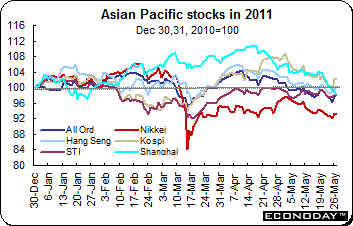 Despite a mostly positive performance on Thursday and Friday, equities declined on the week. Losses incurred earlier in the week were not wiped out by gains on Thursday and Friday. All indexes followed here were down for the week with the exception of the KLCI which was up 0.5 percent. Losses ranged from 0.2 percent (PSEi) to 5.2 percent (Shanghai Composite). Despite a mostly positive performance on Thursday and Friday, equities declined on the week. Losses incurred earlier in the week were not wiped out by gains on Thursday and Friday. All indexes followed here were down for the week with the exception of the KLCI which was up 0.5 percent. Losses ranged from 0.2 percent (PSEi) to 5.2 percent (Shanghai Composite).
Chinese stocks fell for a seventh straight session Friday as worries about inflation and slowing growth restrained buyers. Losses came after HSBC's preliminary May purchasing managers' index fell to a 10-month low of 51.1 from April's final reading of 51.8 as expansion in both new orders and production slowed. However, despite the softening growth, analysts said that there was no need to worry about a hard landing — the data are consistent with China's increase in industrial production of around 13 percent and gross domestic product growth of about 9 percent. However, policy focus continues to be tilted towards taming inflation.
Japanese shares declined on concern over the nation's economic outlook and the yen's strength against the U.S. dollar. However, concerns that Greece may default on its debt repayments limited the gains after G-8 leaders expressed the view that Greece must do more to sort out its finances and work with the IMF to solve its debt crisis. In Australia, equities are very sensitive to commodity prices — resources stocks waxed and waned on the strength in commodity and base metals prices.
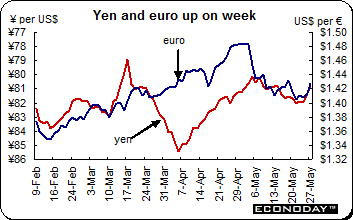 The U.S. dollar declined against all of its counterparts with the exception of the Canadian dollar. With the U.S. economy showing signs of weakening, the Federal Reserve is expected to lag behind other central banks in lifting interest rates from historic lows making the U.S. currency a less attractive investment. The Swiss franc rallied to a record Friday against both the euro and dollar as Europe’s sovereign debt crisis encouraged demand for a refuge and Switzerland’s leading economic indicator held at the highest level in almost five years. The currency, perceived as a safe haven, gained as Luxembourg’s Prime Minister Jean-Claude Juncker said that the International Monetary Fund may not release its share of aid to Greece next month. The U.S. dollar declined against all of its counterparts with the exception of the Canadian dollar. With the U.S. economy showing signs of weakening, the Federal Reserve is expected to lag behind other central banks in lifting interest rates from historic lows making the U.S. currency a less attractive investment. The Swiss franc rallied to a record Friday against both the euro and dollar as Europe’s sovereign debt crisis encouraged demand for a refuge and Switzerland’s leading economic indicator held at the highest level in almost five years. The currency, perceived as a safe haven, gained as Luxembourg’s Prime Minister Jean-Claude Juncker said that the International Monetary Fund may not release its share of aid to Greece next month.
Analysts pointed to a spate of disappointing economic data just this past week to say that the Fed would likely keep interest rates at an extraordinary low level longer than initially thought. For example, first quarter GDP growth was unrevised in its latest estimate at an annualized rate of 1.8 percent and housing data continue to show little signs of life. But investors ignored the rise in May consumer sentiment from the preliminary mid-month reading. Investors see uncertainty with the looming end to QE2.
The euro continues to be under pressure because of sovereign debt woes. Continued uncertainty about whether Greece will have to restructure its debt along with the potential fallout across the continent from such a move has bolstered the franc against the euro. A restructuring could force banks throughout Europe to take losses on Greek debt they hold while other countries that already have received a bailout might then also ask for new terms on loans to ease their debt burdens. However, the euro’s recent behavior pattern has been used of late as a simple guide to the intensity of market angst regarding the eurozone and as such its current stability is encouraging a more positive mood across some risk asset classes.
Selected currencies — weekly results
|
|
2010 |
2011 |
% Change |
|
|
Dec 31 |
May 20 |
May 27 |
Week |
2011 |
| U.S. $ per currency |
|
|
|
|
|
|
| Australia |
A$ |
1.022 |
1.067 |
1.069 |
0.2% |
4.6% |
| New Zealand |
NZ$ |
0.779 |
0.796 |
0.816 |
2.5% |
4.7% |
| Canada |
C$ |
1.003 |
1.028 |
1.023 |
-0.5% |
2.0% |
| Eurozone |
euro (€) |
1.337 |
1.416 |
1.428 |
0.9% |
6.8% |
| UK |
pound sterling (£) |
1.560 |
1.625 |
1.648 |
1.4% |
5.7% |
|
|
|
|
|
|
|
| Currency per U.S. $ |
|
|
|
|
|
|
| China |
yuan |
6.607 |
6.492 |
6.492 |
0.0% |
1.8% |
| Hong Kong |
HK$* |
7.773 |
7.774 |
7.781 |
-0.1% |
-0.1% |
| India |
rupee |
44.705 |
45.016 |
45.168 |
-0.3% |
-1.0% |
| Japan |
yen |
81.230 |
81.689 |
80.857 |
1.0% |
0.5% |
| Malaysia |
ringgit |
3.064 |
3.012 |
3.032 |
-0.6% |
1.1% |
| Singapore |
Singapore $ |
1.283 |
1.239 |
1.236 |
0.2% |
3.7% |
| South Korea |
won |
1126.000 |
1082.800 |
1082.250 |
0.1% |
4.0% |
| Taiwan |
Taiwan $ |
29.299 |
28.756 |
28.821 |
-0.2% |
1.7% |
| Thailand |
baht |
30.060 |
30.280 |
30.305 |
-0.1% |
-0.8% |
| Switzerland |
Swiss franc |
0.934 |
0.879 |
0.853 |
3.1% |
9.5% |
| *Pegged to U.S. dollar |
|
|
|
|
|
|
| Source: Bloomberg |
|
|
|
|
|
|
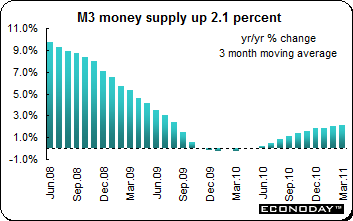 April M3 money supply posted an annual increase of 2.0 percent, down from its 2.3 percent March pace. As a result, the ECB's preferred 3-month moving average measure edged just 0.1 percentage points higher to 2.1 percent. Annual private sector lending growth was up 2.6 percent, from 2.5 percent last time. Loans to non-financial corporation rose 1.0 percent on the year after a 0.8 percent gain in March. Loans to households climbed 3.4 percent, the same 12-month rate as seen at the end of the first quarter. Within the latter, the annual rate of borrowing for house purchase was also steady at 4.4 percent. April M3 money supply posted an annual increase of 2.0 percent, down from its 2.3 percent March pace. As a result, the ECB's preferred 3-month moving average measure edged just 0.1 percentage points higher to 2.1 percent. Annual private sector lending growth was up 2.6 percent, from 2.5 percent last time. Loans to non-financial corporation rose 1.0 percent on the year after a 0.8 percent gain in March. Loans to households climbed 3.4 percent, the same 12-month rate as seen at the end of the first quarter. Within the latter, the annual rate of borrowing for house purchase was also steady at 4.4 percent.
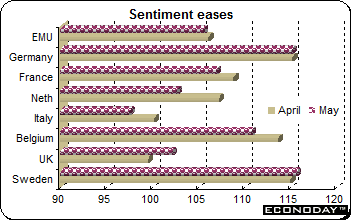 May economic sentiment reading was 105.5 down from 106.1 in April. The minor drop in the overall index reflected mainly a 1.7 point fall in morale to 3.9 in the industrial sector. However, confidence also softened in the retail sector (down 0.7 points to minus 2.5), services (down 1.2 points to 9.2) and in construction (down 0.3 points to minus 24.6). There was a slight improvement in the consumer area where confidence rose 1.8 points to minus 9.8, its highest level since November last year. May economic sentiment reading was 105.5 down from 106.1 in April. The minor drop in the overall index reflected mainly a 1.7 point fall in morale to 3.9 in the industrial sector. However, confidence also softened in the retail sector (down 0.7 points to minus 2.5), services (down 1.2 points to 9.2) and in construction (down 0.3 points to minus 24.6). There was a slight improvement in the consumer area where confidence rose 1.8 points to minus 9.8, its highest level since November last year.
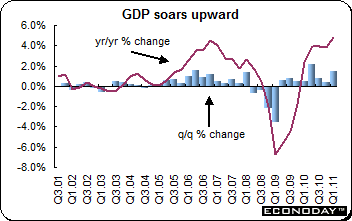 First quarter gross domestic product expanded at an unrevised 1.5 percent quarterly rate and up 4.9 percent on the year. The first look at the GDP expenditure components confirmed a sharp rebound in total investment which jumped 5.0 percent on the quarter following a 0.1 percent contraction at the end of 2010. This alone added 0.9 percentage points to the bottom line. Within the overall rise, equipment investment was up a solid 4.2 percent after a 3.2 percent increase last time while construction recovered from a fourth quarter decline of 2.6 percent with a 6.2 percent surge. Household spending matched the 0.4 percent quarterly pace seen at the end of last year and government spending expanded 1.3 percent after a 0.2 percent contraction. Inventory accumulation had a negative impact for the third successive quarter, subtracting 0.4 percentage points from quarterly growth following a 0.5 percentage point hit in the fourth quarter. Total domestic demand advanced by 1.1 percent. First quarter gross domestic product expanded at an unrevised 1.5 percent quarterly rate and up 4.9 percent on the year. The first look at the GDP expenditure components confirmed a sharp rebound in total investment which jumped 5.0 percent on the quarter following a 0.1 percent contraction at the end of 2010. This alone added 0.9 percentage points to the bottom line. Within the overall rise, equipment investment was up a solid 4.2 percent after a 3.2 percent increase last time while construction recovered from a fourth quarter decline of 2.6 percent with a 6.2 percent surge. Household spending matched the 0.4 percent quarterly pace seen at the end of last year and government spending expanded 1.3 percent after a 0.2 percent contraction. Inventory accumulation had a negative impact for the third successive quarter, subtracting 0.4 percentage points from quarterly growth following a 0.5 percentage point hit in the fourth quarter. Total domestic demand advanced by 1.1 percent.
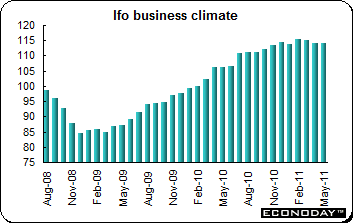 May Ifo survey paints a suitably robust picture of German manufacturing this month. Calculated using a new base year of 2005=100, the overall sentiment index was unchanged at 114.2 and reflected a 0.4 increase in the current conditions index to 121.4 that offset a further weakening in the expectations component by 0.3 points to 107.4. The growing divergence in the two sub-indexes is no surprise as expectations continue to build that the current boom state of the manufacturing sector cannot be sustained indefinitely. At a sector level, confidence declined 0.9 points to 27.8 in manufacturing and 1.3 points to 17.1 in wholesale. Services saw a 1.5 point drop to 27.4. However, morale in retail bounced 5.6 points to 15.2 and edged up 0.1 to minus 5.6 in construction. May Ifo survey paints a suitably robust picture of German manufacturing this month. Calculated using a new base year of 2005=100, the overall sentiment index was unchanged at 114.2 and reflected a 0.4 increase in the current conditions index to 121.4 that offset a further weakening in the expectations component by 0.3 points to 107.4. The growing divergence in the two sub-indexes is no surprise as expectations continue to build that the current boom state of the manufacturing sector cannot be sustained indefinitely. At a sector level, confidence declined 0.9 points to 27.8 in manufacturing and 1.3 points to 17.1 in wholesale. Services saw a 1.5 point drop to 27.4. However, morale in retail bounced 5.6 points to 15.2 and edged up 0.1 to minus 5.6 in construction.
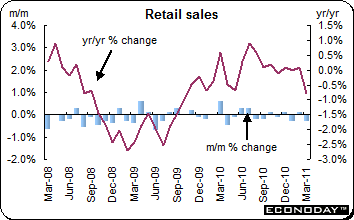 March retail sales declined 0.2 percent on the month and were 2.0 percent lower on the year, the worst performance since January 2010. Purchases of food dropped 0.3 percent from February while non-food demand was off 0.2 percent. The March slide made for a quarterly contraction in overall sales of 0.3 percent. March retail sales declined 0.2 percent on the month and were 2.0 percent lower on the year, the worst performance since January 2010. Purchases of food dropped 0.3 percent from February while non-food demand was off 0.2 percent. The March slide made for a quarterly contraction in overall sales of 0.3 percent.
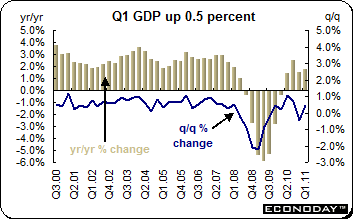 First quarter gross domestic product expanded 0.5 percent and was up 1.8 percent from a year ago. Household spending sank a hefty 0.6 percent on the quarter, its steepest decline since the second quarter of 2009. At the same time, gross fixed capital formation dropped 4.4 percent, also its worst performance since the second quarter in 2009. However, general government final consumption was up an unsustainable 1.0 percent. Total domestic expenditure slumped 1.3 percent from the fourth quarter and now stands just 0.5 percent higher on the year. However, in the foreign trade sector export volumes jumped 3.7 percent while imports sagged 2.3 percent. As a result, the real trade deficit nearly halved to Stg5.7 billion, in turn adding 1.7 percentage points to quarterly GDP growth. Part of this boost reflected changes to the VAT treatment of aircraft which distorted the quarterly import profile. In terms of output, services expanded an unrevised 0.9 percent on the quarter while industrial production grew 0.2 percent or 0.2 percentage points less than originally thought. Within the latter, manufacturing output was up an unrevised 1.1 percent. The contraction in construction activity was shaded to 4.0 percent from 4.7 percent. First quarter gross domestic product expanded 0.5 percent and was up 1.8 percent from a year ago. Household spending sank a hefty 0.6 percent on the quarter, its steepest decline since the second quarter of 2009. At the same time, gross fixed capital formation dropped 4.4 percent, also its worst performance since the second quarter in 2009. However, general government final consumption was up an unsustainable 1.0 percent. Total domestic expenditure slumped 1.3 percent from the fourth quarter and now stands just 0.5 percent higher on the year. However, in the foreign trade sector export volumes jumped 3.7 percent while imports sagged 2.3 percent. As a result, the real trade deficit nearly halved to Stg5.7 billion, in turn adding 1.7 percentage points to quarterly GDP growth. Part of this boost reflected changes to the VAT treatment of aircraft which distorted the quarterly import profile. In terms of output, services expanded an unrevised 0.9 percent on the quarter while industrial production grew 0.2 percent or 0.2 percentage points less than originally thought. Within the latter, manufacturing output was up an unrevised 1.1 percent. The contraction in construction activity was shaded to 4.0 percent from 4.7 percent.
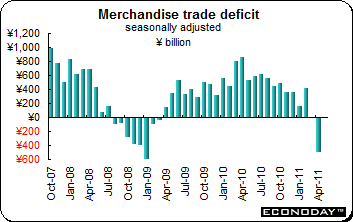 April unadjusted merchandise trade deficit was ¥463.7 billion. On the year, exports dropped 12.5 percent while imports were up 8.9 percent. The data reflect the impact of the March earthquake and tsunami. On the year, exports dropped with virtually all trading partners. Exports were down 10.7 percent with the EU and 23.3 percent with the U.S. Exports with China were down 6.8 percent. The export drop was led by autos and semiconductors while the increase in imports was not surprisingly led by oil products, crude and liquefied natural gas. On a seasonally adjusted basis, the trade deficit was ¥496.4 billion. March’s surplus was ¥1.4 billion. On the month, exports dropped 5.5 percent after sinking 8.3 percent in March. Imports were up 3.8 percent after declining 1.3 percent in March. April unadjusted merchandise trade deficit was ¥463.7 billion. On the year, exports dropped 12.5 percent while imports were up 8.9 percent. The data reflect the impact of the March earthquake and tsunami. On the year, exports dropped with virtually all trading partners. Exports were down 10.7 percent with the EU and 23.3 percent with the U.S. Exports with China were down 6.8 percent. The export drop was led by autos and semiconductors while the increase in imports was not surprisingly led by oil products, crude and liquefied natural gas. On a seasonally adjusted basis, the trade deficit was ¥496.4 billion. March’s surplus was ¥1.4 billion. On the month, exports dropped 5.5 percent after sinking 8.3 percent in March. Imports were up 3.8 percent after declining 1.3 percent in March.
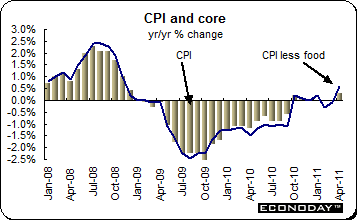 April consumer prices were up 0.3 percent both on the month and on the year. Core CPI which excludes only fresh food was up 0.4 percent on the month and 0.6 percent on the year. This was the first annual increase since the 1.0 percent rise in November 2008. Excluding both fresh food and energy, the CPI was up 0.2 percent and slipped 0.1 percent on the year. Energy costs soared 7.3 percent after rising 6.3 percent in March. It was noted that the downward pressures from a tuition subsidy has ended. Goods prices were up 0.5 percent and 0.4 percent on the year while services prices were unchanged on the month and edged up 0.2 percent on the year. April consumer prices were up 0.3 percent both on the month and on the year. Core CPI which excludes only fresh food was up 0.4 percent on the month and 0.6 percent on the year. This was the first annual increase since the 1.0 percent rise in November 2008. Excluding both fresh food and energy, the CPI was up 0.2 percent and slipped 0.1 percent on the year. Energy costs soared 7.3 percent after rising 6.3 percent in March. It was noted that the downward pressures from a tuition subsidy has ended. Goods prices were up 0.5 percent and 0.4 percent on the year while services prices were unchanged on the month and edged up 0.2 percent on the year.
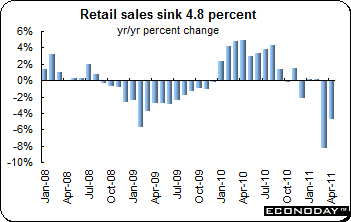 New data continue to show the devastating impact of the March 11 earthquake and tsunami. April retail sales dropped 4.8 percent when compared with last year after plummeting 8.3 percent in March. Fuel sales were up 1.0 percent after jumping 5.3 percent in March. Machinery sales slumped 9.6 percent after plunging 17.1 percent the month before. Auto sales sank 38.0 percent on the year after declining 32.7 percent in March. New data continue to show the devastating impact of the March 11 earthquake and tsunami. April retail sales dropped 4.8 percent when compared with last year after plummeting 8.3 percent in March. Fuel sales were up 1.0 percent after jumping 5.3 percent in March. Machinery sales slumped 9.6 percent after plunging 17.1 percent the month before. Auto sales sank 38.0 percent on the year after declining 32.7 percent in March.
Weak economic data and continued worries about the Greek financial situation combined to make investors wary of risk. Equities dropped on the week and so did the U.S. dollar. Japan continued to post data that showed the economic damages incurred from the earthquake and tsunami.
The Bank of Canada meets Tuesday and is likely to leave its policy rate unchanged at 1.0 percent. It is a busy week for new economic data. Manufacturing and services PMIs are on the agenda. Australia and Canada are the last two major countries to report first quarter growth. In Japan, industrial production, unemployment and household spending are expected to show the impact of the March disaster. But regardless of the numerous data reports to be released around the globe, most investors will be awaiting Friday’s U.S. employment situation report.
| Central Bank activities |
|
| May 31 |
Canada |
Bank of Canada Announcement |
|
|
|
| The following indicators will be released this week... |
| Europe |
|
|
| May 31 |
EMU |
Unemployment (April) |
|
|
Harmonized Index of Consumer Prices (May flash) |
|
Germany |
Unemployment (April) |
|
Italy |
Producer Price Index (April) |
| June 1 |
EMU |
Manufacturing PMI (May) |
| June 3 |
France |
ILO Unemployment (Q1.2011) |
|
|
|
| Asia/Pacific |
|
|
| May 31 |
Japan |
Household Spending (April) |
|
|
Unemployment (April) |
|
|
Industrial Production (April) |
| June 1 |
Australia |
Gross Domestic Product (Q1.2011) |
| June 2 |
Australia |
Merchandise Trade Balance (April) |
|
|
Retail Sales (April) |
|
|
|
| Americas |
|
|
| May 30 |
Canada |
Monthly Gross Domestic Product (March) |
|
|
Gross Domestic Product (Q1.2011) |
| May 31 |
Canada |
Industrial Product Price Index (April) |
Anne D Picker is the author of International Economic Indicators and Central Banks.
|

